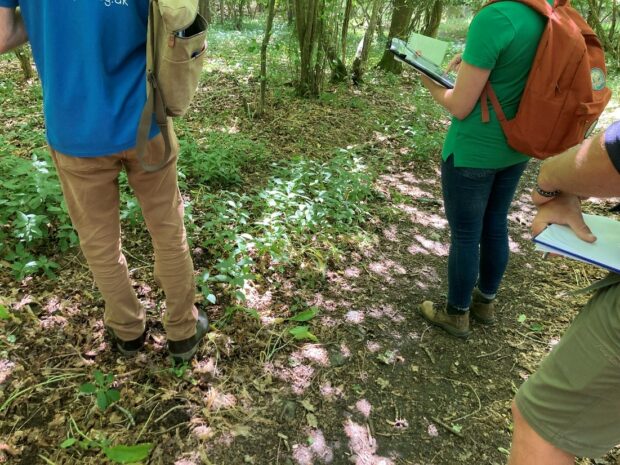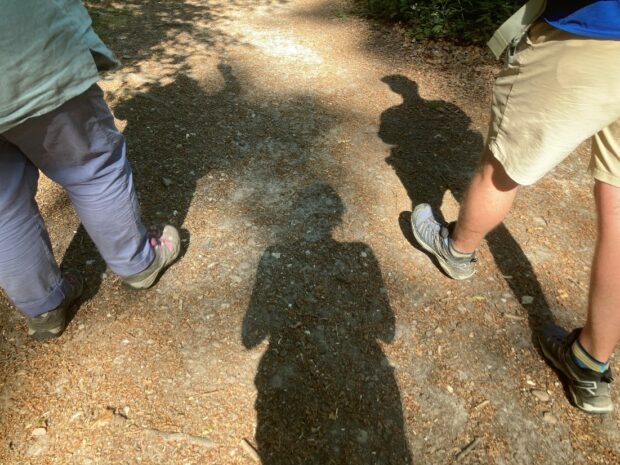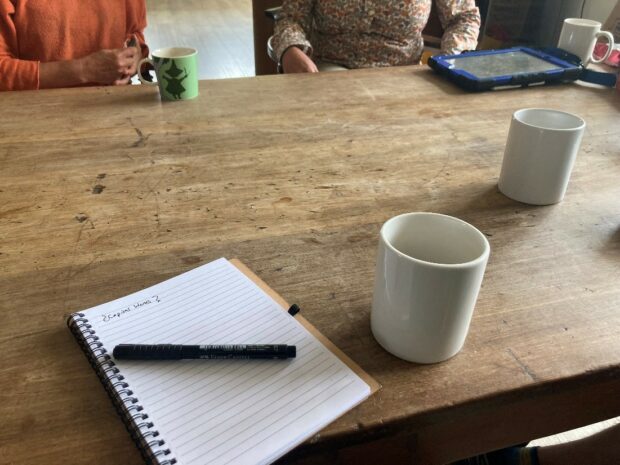
In May this year we were tasked with understanding how government farming advisers could encourage farmers and land managers to aim for more ambitious environmental outcomes when applying for funding from the Countryside Stewardship scheme. With our backgrounds in social research (Dan) and policy design (Becky), we decided to include an ethnographic element in our research. This method would allow us to learn things about our participants which might not be strictly within our scope (in this case Countryside Stewardship), but from experience we knew these kinds of insights could prove fundamental in understanding our research question and the policy area more deeply. And from a user-centred perspective, these kinds of insights are critical to make sure we are designing the right thing for people.
What is ethnography?
Ethnography is a qualitative research method which involves observing people’s behaviours in their natural environments. It aims to capture a detailed and rich account of a social setting from the participant’s perspective.
Our research involved shadowing government farming advisers on their farm visit days. This allowed us to observe in real time how they went about advising farmers and land managers, hearing about issues that came up, and observing their interactions more generally. We followed our shadowing visits with online interviews and journey mapping, so that we could also ask specific questions regarding their role and experience advising on Defra’s Countryside Stewardship scheme.

Ethnographers can take on both an active role, participating in the research setting, or a passive role, observing from a short distance. Our shadowing approach allowed us to both observe advisers’ interactions with farmers and also be part of the farm visit itself. This included the possibility of asking some questions and experiencing other aspects of the adviser’s day, including travelling between rural sites and their lunch break time.
Ethnographic research can be recorded in a range of ways, including writing up field notes, keeping ethnographic diaries, capturing photographs and videos, as well as collecting any artefacts that provide insight into participants’ lived experience. These activities tend to be led by the researcher, but can also be led by the participant. For example, asking participants to keep a video diary using their mobile phone. In this instance, we asked permission to take photos during our visits. We were keen to include this visual element in our research to give a richer, more compelling level of context that can inspire more empathy when sharing findings with people who weren’t part of the research.
We’ll share our top 3 benefits for bringing an ethnographic, lived experience approach into your user research and service design practice
Benefits of researching lived experience
- An ethnographic approach allows you to discover insights and reveal blind spots that you might not otherwise find. Spending time with participants in their world, allowing them to tell and show us what matters to them, can lead us to insights we didn’t realise existed - often referred to as ‘unknown unknowns’. For designers these insights are the gold dust of research, as they give a more holistic understanding of the people we’re designing for, and where the real design opportunities lie.
For our work, this level of insight flipped our research question. By spending time with advisers in person, we realised that ambitious funding applications start with ambitious farmers and land managers. On our shadowing visits, we observed first-hand the creative and sensitive ways that advisers find out what farmers and land managers are interested in and passionate about. They then use that knowledge to build a relationship over time, fostering their ambition in a way that’s meaningful to them. This level of insight can offer important new focus and the opportunity to reframe a policy challenge.
- An ethnographic approach helps put insights into context. Particularly for complex policy areas like farming advice, where there are multiple services and interventions at play from government, private and the third sector, it's critical to understand the context in which advice is given. This is where observations and time in the field with participants can help during analysis to triangulate and contextualise what participants say in interviews with what they actually do in context.In our research interviews we heard from advisers of the importance of giving advice in-person on farm visits for building relationships with farmers, compared to giving advice by phone, video call or letter. But it was the opportunity to observe these relationships in action that afforded us the context to understand how critical in-person farm visits are. For example, we observed how advisers adapted and nuanced their communication style according to the farmer or land manager they were visiting.
-
An ethnographic approach helps to build participant trust and participation in the research and design process. This was particularly important for us because we followed up our research activities with two ‘codesign’ or ‘ideas’ workshops, where we invited government farming advisers to share their ideas on how they thought we could increase the ambition of Countryside Stewardship applications. Despite it being a very busy time of year for farming advisers, we recruited enough advisers, including those from our research sample. Everyone who attended the workshops was keen to participate and share their ideas, because we had already established meaningful, trusted relationships through our ethnographic research.
That said, trust can be made or broken during research. And given the more intimate nature of ethnographic, lived experience research compared to other methods, it’s particularly important to consider the ethical implications. During our research, advisers allowed us into their busy working lives and farmers welcomed us into their homes. We found it important to be open, honest and transparent with our participants. In practice, this meant managing expectations about the outcomes from our work, and taking the time to playback both the research findings and outcomes to participants. We also made sure we listened to and documented participant’s perspectives that went beyond the scope of our research, and passed this onto relevant teams. You can read more about how to build trusted relationships during design research in Ideo’s Little Book of Design Research Ethics.

Inspired to try ethnography yourself?
The GDS Service Manual has guidance to help you plan and carry out contextual research and observation. If you’re new to lived experience research, social researchers can also be a great support advising on how to bring an ethnographic approach to your research. You can contact the Government Social Research (GSR) Profession to find social researchers in your department. You’re also welcome to contact Dan (daniel.barwick2@defra.gov.uk) directly if you’re keen to draw on his expertise and experience with ethnography.
Policy Lab (where Becky worked previously) has been pioneering the use of ethnography in policy making across government for several years now. You can read about how they used film ethnography for their lived experience research on the Independent review of Children’s Social Care, and watch the ethnographic videos they produced for the National Landscapes Review and the Windrush Lessons Learnt Review.
Becky Miller (senior service designer) and Dan Barwick (user researcher) work on Defra’s Farming and Countryside Programme.
2 comments
Comment by Kiki posted on
This is an interesting read. Thank you for sharing your experience and insights.
I loved reading it.
Comment by Rachel A.Wood posted on
An excellent article - and it good to see this kind of important work going on - thank you for sharing it 😊 (Service Design Lead - Local Gov. and PhD Researcher)